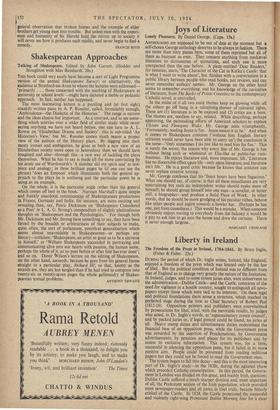Shakespearean Approaches
Talking of Shakespeare. Edited by John Garrett. (Hodder and Stoughton with Max Reinhardt. 20s.) Tins book could very easily have become a sort of Light Programme version of the annual Shakespeare Survey; or alternatively, the audience at Stratford-on-Avon to whom the lectures were addressed— 'primarily . . . those concerned with the teaching of Shakespeare at university or school levels'—might have dictated a feeble or pedantic approach. In fact, neither has happened. The most fascinating lecture is a puzzling and (at first sight) crankily written piece by A. P. Rossiter, called, formidably enough, 'Ambivalence—the Dialectic of the Histories.' The range is narrow and the ideas elusive but important. As a contrast, and to see some- . thing which scurries over a wider field of similar study while never saying anything we have not heard before, one can turn to A. L. Rowse on 'Elizabethan Drama and Society': this is sub-titled 'An Historian's View,' but Mr. Rossiter comes much nearer a proper view of the politics of the History plays. By digging into their meaty ironies and ambiguities, he gives us both a new view of an Elizabethan society more open to heterodoxy than we should have imagined and also—through this—a new way of tackling the plays • themselves. What he has to say is made all the more convincing by his acute use of Wordsworth's 'A slumber did my spirit seal' as test- piece and analogy; in three brilliant pages he (if one can use the phrase) ' does an Empson' which illuminates both the general ap- proach to the plays he is outlining and the particular poem he is using as an example.
On the whole, it is the particular angle rather than the general which comes off best in the book. Norman Marshall's quite simple and frankly anecdotal reminiscences of Shakespearean productions in France, Germany and India, for instance, are more exciting and revealing than, say, Patric Dickinson on Shakespeare Considered as a Poet' or L. A. G. Strong's compendium of slightly platitudinous thoughts on 'Shakespeare and the Psychologists.' For though both Mr. Dickinson and Mr. Strong have something to say, they have been forced by the breadth or arbitrariness of their subjects to make, quite often, the sort of portentous, pontifical generalisation which seems almost unavoidable in Shakespearean—or perhaps any literary—criticism: Shakespeare, an artist so great as to be a universe in himself,' or William Shakespeare succeeded in portraying and communicating alive into our hearts with passion, the human scene, perhaps the whole of it, as no poet before or after him has ever done'; and so on. Dover Wilson's lecture on the editing of Shakespeare, on the other hand, succeeds, because he goes from his general theme straight to a particular play, Richard III; so that, knotty as the strands are, they are less tangled than if he had tried to compress into twenty-six or twenty-seven pages the whole gallimaufry of Shakes-


































 Previous page
Previous page